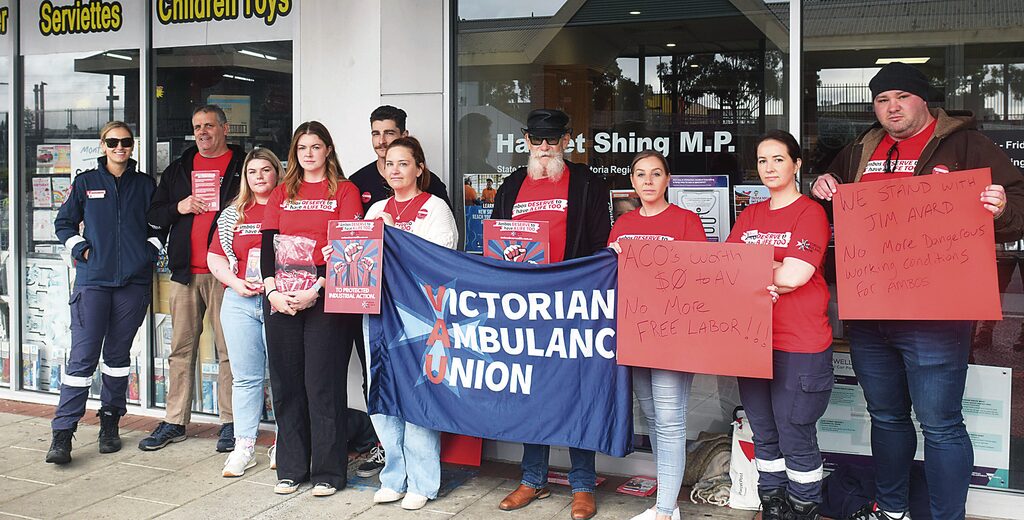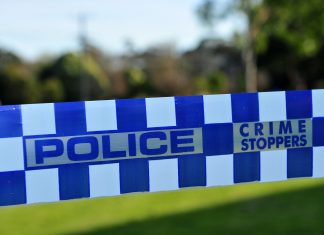By BLAKE METCALF-HOLT and STEFAN BRADLEY
LOCAL paramedics and union members last Thursday, tired and angry, protested outside the Morwell office of state government frontbencher Harriet Shing, with others meeting with Member for Gippsland South Danny O’Brien at his Sale office as part of a long-standing campaign over work conditions.
Members of the VAU (Victoria Ambulance Union) demanded that Ms Shing, the Member for Eastern Victoria Region, support their fight for better working conditions to combat fatigue from long work hours. They also argued for further boosts to the healthcare budget.
This follows a lengthy battle for stronger health and safety procedures for Victorian paramedics, whose concerns were brought to the brink after a life-threatening incident to North East Melbourne paramedic, Jim Avard, who fell asleep behind the wheel during an 18-and-a-half hour shift.
The VAU have been desperately trying to reach a new agreement in principle with Ambulance Victoria through a new EBA (Enterprise Bargaining Agreement), but union members say that Ambulance Victoria isn’t prepared to come to the table.
“The main thing is related to fatigue and end-of-shift management, we’re not actually asking for a bigger pay rise like the nurses, we’re asking for safer working conditions,” a delegate member of the VAU state council and local paramedic, Phill Bell said.
“We’ve been saying to Ambulance Victoria, we want better end-of-shift management so that we’re not put in those positions where we’re trying to work and drive, 14, 15, 16 hours into the shift. It’s just not safe and it’s not fair, and that’s the issues where they aren’t willing to meet us (on), which is unreasonable.”
The passionate yet fed up ambulance workers have been attempting to speak with Ms Shing but had not heard from her. The result was the demonstration at her Morwell office for hours to demand her to show her support by pushing for a rise in the ambulance budget.
Bernard Goss, part of the VAU is a long-time Sale Ambulance Auxiliary member and paramedic of more than 45 years. He said it was not unusual for an ambulance to be ramped for eight or more hours during a shift as the paramedic must remain with the patient until the hospital is freed up, meaning they may only tend to one person during their shift.
“The government needs to fix the rampings at the hospitals because ramping’s a big issue for the ambulances… that means that they can’t respond to any other jobs,” Mr Goss said.
“So what we are wanting the government to do is fund the health services properly to enable it to work properly because it’s just not working at the moment.”
Since the protest, Mr Goss said they’ve spoken to Harriet Shing.
“(Ms Shing) is aware of some of the issues and she will speak to the Health Minister to put our concerns,” he said.
“It’s a wait and see if they’ll do anything.
“This is not so much about trying to get a big pay rise or anything, it’s about working conditions improving so that people actually have a work-life balance.”
In a statement to the Gippsland Times, a state government spokesperson said that workplace bargaining in this matter is between Ambulance Victoria and the Victorian Ambulance Union.
“We value the dedication and hard work that our paramedics do every day – they play a critical role in keeping Victorians healthy and safe, and we thank them for their service to the state,” the spokesperson said.
“We expect Ambulance Victoria and the Victorian Ambulance Union to continue to negotiate in good faith and reach a resolution as soon as possible.”
Mr Goss said he has been planning on retiring, but whilst these union issues persist he’ll keep fighting alongside his colleagues.
VicRoads has reported that if a driver has been awake for 17 hours or more that it is the equivalent of being over the 0.5 blood-alcohol limit.
“At what point is that paramedic not able to make a rational call about what their own fatigue is, at what point does (Ambulance Victoria) have a duty of care to their staff to be like ‘I know you can’t make a reasonable call right now because the data says you are fatigued regardless of what you’re saying’ and they’re not taking that duty of care,” Mr Bell said.
Other key areas of focus the union hopes for Ambulance Victoria to consider includes the issues of ambulance ramping at regional hospitals (like at Latrobe Regional Hospital) and direct recognition to Ambulance Community Officers (ACOs), who volunteer their time to alleviate the pressures of the paramedics’ work load.
ACOs say that they are being used as free labour in shifts lasting as long as 10 hours.
“We don’t get paid to do our truck check, we don’t get paid to stock our truck or sign mediations in and out at the start of every shift, we don’t get paid for anything,” ACO Samantha Pierce said.
“We get paid if we get a job, but I’ve personally sat there for nine shifts in a row and not got one job, so that’s ninety hours I’ve dedicated of my time for zero dollars for me (being there) and they don’t recognise that, they don’t care, so we’re asking for an on call allowance that makes it fair.”
Mr Bell said that at the moment, the paid workforce was so thin and overworked, there was a reliance on AOCs. If that pillar evaporated, the Gippsland area could have about five ambulances overnight in the entire region.
“It really does show that the system is broken when you can’t run an ambulance service without volunteers; that’s not a viable ‘business as usual model’ because they’re volunteers. They could not turn up if they didn’t want to, they are under no obligation to do so,” he said.
“It’s in dire straits and without these guys (ACOs), everyone in the (Latrobe) Valley would be in real risk of losing their life.”
Local paramedic Libby Hunter, who has a 10-year background volunteering in Western Australia, said that she received an honorarium to cover a portion of the food and fuel during a shift; in contrast, Ambulance Victoria denies them a $5 per hour on-call rate for ACOs.
“It’s like being in a really toxic relationship. You want to love your employer, we love what we do, we love our patients, and we love our community and it’s why we do it… we’re literally getting shoved into this box by our employer and being told we’re wrong, we’re wrong, we’re wrong, (that) we’re complaining, we’re whinging and just treating us like a pack of ratbags really when we’re asking for things that are really simple,” Ms Hunter said.
The issue of ramping involves the patient flow through from the ambulance into the care of ED (Emergency Department) which has created constant clutter impeding paramedics from delivering patients safely and continuing on with their shift to help others in the community.
Paramedics during this period of industrial action have constructed intuitive measures to support fellow workers during ramping instances called ‘a-podding’.
“A-podding is where we look after the patient of another crew on the ramp so that crew can be released, we will do that amongst ourselves if it’s a health and wellbeing situation, so if somebody’s really late for a meal break, somebody’s about to go (into) overtime, we will do that amongst ourselves to make sure that we look out for our own,” Ms Hunter said.
Ms Hunter says that Ambulance Victoria guilt trip workers into doing more than they’re individually capable of, not encouraging a-podding, and that they simply don’t care.
Mr Goss organised a meeting with Danny O’Brien at his Sale office the same day as the protest in Morwell. A group of about a dozen paramedics, including Mr Goss, said he wanted to ensure that Mr O’Brien was “aware of what was going on”, and that he can discuss these issues with the government and “put a bit of pressure on”.
Mr O’Brien said, “It was good to listen to the paramedics about their concern and particularly their frustration that the government and Ambulance Victoria don’t seem to understand the challenges of distance and lack of resources for paramedics in regional areas like Gippsland.
“The government continues to blame the pandemic for the state of our health system and ambulance services, but despite multiple initiatives and claims of billions of dollars from Labor, the system is not functioning well for patients and it’s paramedics who are taking the strain.”











